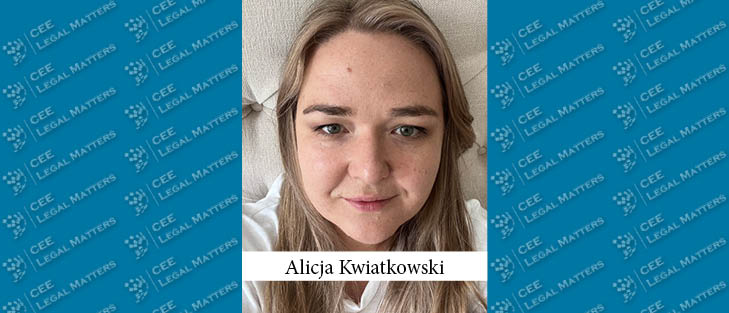I have always been passionate about learning languages, traveling, and getting to know people from different cultures. While studying in law school in my hometown Warsaw, Poland, I applied for the Erasmus Student Exchange scholarship. I went to Stockholm, Sweden, to study law for one year. This year turned into more than a decade, during which I earned an LL.M. in IP law and worked as in-house legal counsel and as Head of Legal for Swedish IT/SaaS companies with global operations. Now I am back in Warsaw, but I am still working internationally.
During my time in Sweden, I had the pleasure of working in and managing very international teams of legal professionals. At TrustWeaver and then Sovos I worked in their Stockholm office with an international team of up to 10 lawyers, coming from Europe, the US, South America, and China. There was no one individual coming from the same country and we all worked on-site in the same office – quite an uncommon situation. At Iptor the legal team that I managed consisted of lawyers and paralegals from Belgium, Poland, and Sweden – all based in different offices.
Using the Right Tools and Keeping Up the Team Spirit
The Head of Legal role at Iptor was my first real managerial role. Earlier, I was a Team Leader for less experienced lawyers, but without actual HR responsibilities. We were fortunate to have an empathetic female leader as a CEO at Iptor. She had a great interest in HR-related matters and put a lot of effort into developing her managers and giving us the right tools to run a team effectively. My teammates were based in three different countries across Europe, but we were able to have efficient communication and a great team spirit. We were using a performance development platform for managers and their teams, called Saberr Coachbot and KanBan-based task planning in MS Teams. The first tool allowed and prompted us to set our team purpose and goals aligned with the company goals, take notes from one-to-one meetings, run performance reviews, and more. The second tool allowed us to track everyday work tasks. Later, we implemented a contract lifecycle management tool which allowed us to cooperate on contract work more efficiently. We also used to have weekly team meetings, where we spent at least 15 minutes socializing – that is talking about things not related to work. I felt that the team had the clarity about what was expected of them, and we simply all liked each other.
Cultural Literacy
While working internationally, you should be asking yourself these questions:
- Are you viewing the world from your own cultural perspective?
- Is it a personality trait or maybe a cultural difference?
- How can you adapt to other cultures without sacrificing your integrity?
Why?
Because studies show that cultures differ in communication, humor, perception of good manners, sense of time, concepts of status and trust, hierarchy and authority, approach to truth, decision-making, leadership styles, negotiations, body language, and more. Some linguists and ethnologists even claim that the language we speak determines the way we think and that being bi- or multi-lingual gives us added dimensions of reality. One thing is for sure, being aware of and sensitive to cultural differences truly helps to bridge communication gaps.
Your American boss is writing you very short emails – is she being disrespectful or just busy? ... No, concise communication is seen as a virtue in the US. Your Chinese colleague is quiet in meetings – is he clueless or just shy? ... Speaking without being given the floor is seen as bad manners in China.
If you want to raise your cultural literacy, you need to be open-minded and not judge others for being different than yourself. Be sensitive to cultural differences. Every employee is equal and should have the right to keep their heritage and be their true selves. On the other hand, stay professional and seek common work values. Keep an eye out for communication style differences and do not take up topics such as politics or religion. Even though it is quite old, I can recommend Kiss, Bow or Shake Hands by Terri Morrison and Wayne A. Conaway – a very useful guide on international business etiquette and cultural practices in 60 countries.
By Alicja Kwiatkowski, Senior Counsel, Group Data Protection Officer, Mirantis
















